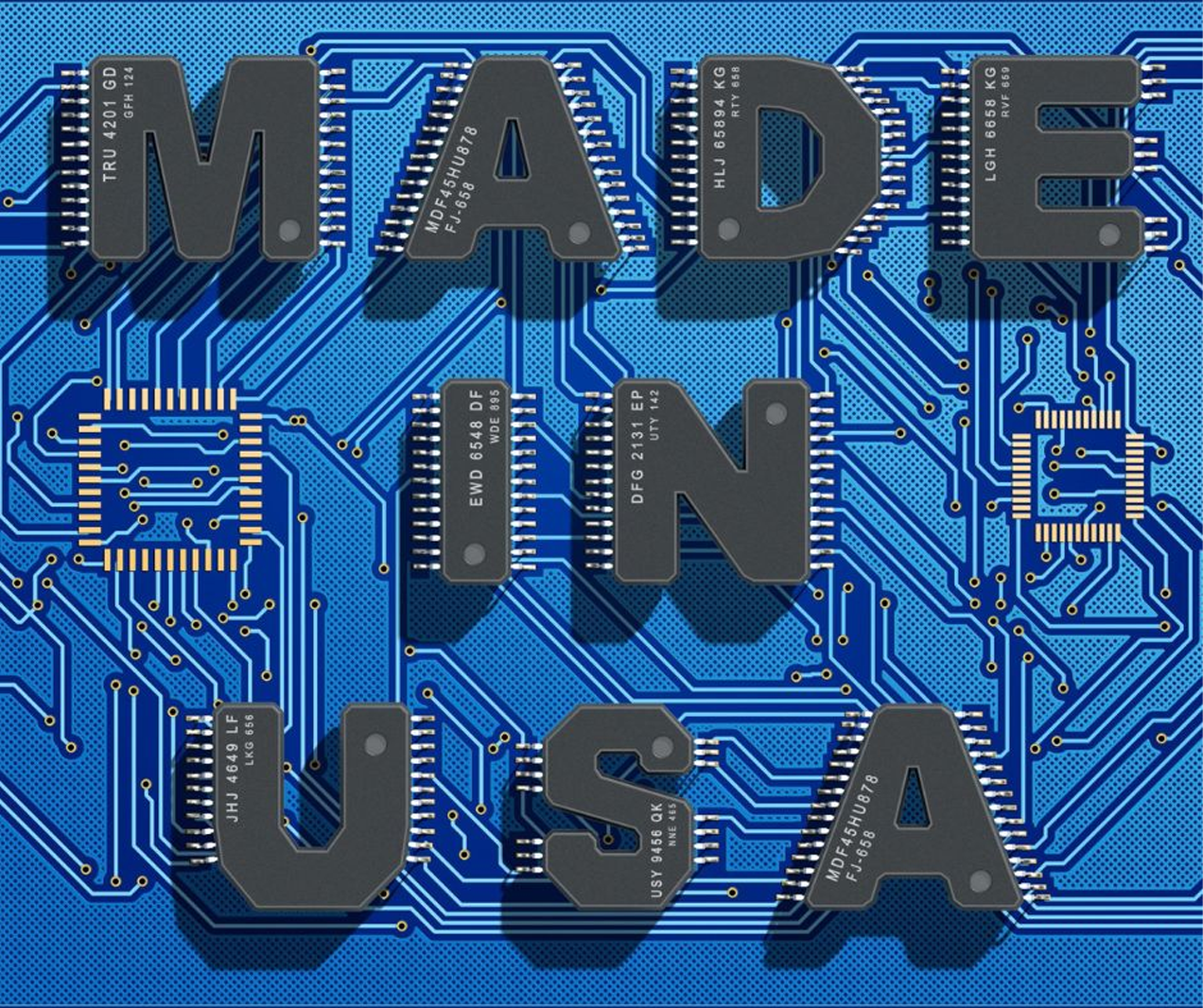 |
Dear IPC Members:
As you already know, electronics manufacturing contributes powerfully to the U.S. and global economy, but a great deal of work must be done to reinvent and reinvigorate our industry for the future.
Here in Washington, we are encouraged by new legislation indicating a bipartisan commitment to U.S. manufacturing that is long overdue. But we must ensure that this bill, which would bolster the under-appreciated PCB sector, gains wide support in the U.S. Congress. See TOP OF THE WEEK below for more details and how you can take action. |
Meanwhile, there are a host of regulatory actions underway across the globe in which your input would help inform policy makers. See ENVIRONMENT AND HEALTH below for the latest concerns and opportunities.
All the best,
Chris Mitchell
Vice President, Global Government Relations
The Headlines at a Glance:
TOP NEWS OF THE WEEK
- Tell Congress to Support New Proposal to Boost U.S. PCB Sector
QUOTE OF THE WEEK
- IPC’s Shawn DuBravac Comments on Global Supply Chain Trends
IPC ADVOCACY AND YOU
- A Robust U.S. Electronics Industry is in the National Interest!
ENVIRONMENT AND HEALTH
- Consultation Opens on the General Review of the RoHS Directive
- EPA Reopens Comment Period on 20 Toxic Substances
- Commission Opens Consultation on a New Regulation for Sustainable Products
- How Are PFAS Policies Affecting the Electronics Industry?
- Interested in Chemical and Product Regulations in South Korea?
- Japan Updates Priority Assessment Chemical Substances List
EUROPEAN UNION
- IPC Calls for Robust Support of Advanced Packaging in European Chips Act
- EU Launches Public Consultation on Draft Sustainability Reporting Standards
TRADE AND SUPPLY CHAIN
- Biden Administrations Announces New Additive Manufacturing Initiative
HELP US SPREAD THE WORD ON SOCIAL MEDIA
KEEP IN TOUCH WITH US
TOP NEWS OF THE WEEK
Tell Congress to Support New Proposal to Boost U.S. PCB Sector: The electronics manufacturing industry is welcoming a new, bipartisan proposal in the U.S. Congress that would help bring back the U.S. printed circuit board (PCB) sector. The Supporting American Printed Circuit Boards Act of 2022, introduced by Reps. Anna Eshoo (D-CA) and Blake Moore (R-UT), would incentivize purchases of domestically produced PCBs as well as investments in factories, equipment, workforce training, and research and development (R&D). Please take a few minutes to contact your Members of Congress and urge them to support and cosponsor this bill. IPC Contact: Chris Mitchell.
QUOTE OF THE WEEK
 |
“Russia’s invasion of Ukraine is a negative supply shock on already strained supply chains. It will take many months to fully determine the full effect it is having on the electronics industry.”
– Shawn DuBravac, IPC chief economist, comments on the state of the global supply chain in IPC’s May Global Sentiment Survey.
|
IPC ADVOCACY AND YOU
A Robust U.S. Electronics Industry is in the National Interest: Encouraging the U.S. government to take a holistic approach to rebuilding its domestic electronics manufacturing ecosystem is the central theme of IPC’s IMPACT Washington Advocacy Campaign. If you agree, please visit the IPC Online Advocacy Center now to tell your Members of Congress to help secure federal support for the entire electronics supply chain. It only takes a minute and has a real impact! IPC Contact: Ken Schramko.
ENVIRONMENT & HEALTH
 |
Consultation Opens on General Review of RoHS Directive: The European Commission recently opened a public consultation on the general review of the Restriction of Hazardous Substances (RoHS) Directive, including evaluation of the criteria and timelines for exemptions. The RoHS Directive, which aims to protect human health and the environment and maximize recovery of certain hazardous substances after their use, is one of the most important policies shaping electronics manufacturing. The deadline for comment is June 2. IPC will coordinate a response to this questionnaire, and we invite your engagement with us. IPC Contact: Kelly Scanlon.
EPA Reopens Comment Period on 20 Toxic Substances: The U.S. Environmental Protection Agency (EPA) has reopened the dockets for the 20 high-priority substances to undergo risk evaluation under the Toxic Substances Control Act (TSCA). This provides an additional opportunity for the electronics manufacturing industry to submit information that would help inform the risk evaluation processes for these chemicals, some of which have relevance to electronics manufacturing processes and products. The dockets are open until June 9. Please let us know if you are interested in this opportunity to inform future policy decisions. IPC Contact: Kelly Scanlon.
Commission Opens Consultation on New Regulation for Sustainable Products: The European Commission has opened a public consultation on a regulation that would repeal the existing Ecodesign Directive and establish a new framework for setting ecodesign requirements for sustainable products. The proposed regulation notably includes requirements for identifying substances of concern across a product’s life cycle and other information requirements, including a digital product passport. The consultation is open through June 22. IPC welcomes your feedback on the proposed regulation. IPC Contact: Kelly Scanlon.
How Are PFAS Policies Affecting the Electronics Industry? On April 21, Kelly Scanlon, IPC’s director of EHS policy and research, led a free webinar on how per- and polyfluoroalkyl substances (PFAS) are used in electronics manufacturing and how future regulations of PFAS might affect the industry. You can view the slide deck here. Please let us know if you have any questions on what your company can do to address PFAS policy activities. IPC Contact: Kelly Scanlon.
Interested in Chemical and Product Regulations in South Korea? On April 11, South Korea’s Ministry of Environment (MoE) published an official guidance to help manufacturers and importers better verify chemical substances under the Chemicals Control Act (CCA). If your business manufactures or imports relative chemical substances, please refer to the guidance for updated verification procedures or documentation you may need. Meanwhile, on April 27, the MoE designated 162 new chemical substances subject to priority management under the Act on the Registration and Evaluation of Chemicals of South Korea (K-REACH). All manufacturers and importers of the newly added priority control chemical substances must be registered or notified by January 1, 2024. IPC Contact: Kelly Scanlon.
Japan Updates Priority Assessment Chemical Substances List: On April 1, Japan’s Ministry of Economy, Trade, and Industry (METI) designated four new substances as Priority Assessment Chemical Substances (PACs) under its Chemical Substance Control Law (CSCL). Fourteen chemicals were also removed from the list in a corresponding move. All manufacturers and importers of PACs are required to submit annual reports and additional hazard data. Let us know if you are affected by this update. IPC Contact: Kelly Scanlon.
EUROPEAN UNION
 |
IPC Calls for Robust Support of Advanced Packaging in European Chips Act: IPC called for robust support of advanced packaging in comments submitted this week to the European Commission on the European Chips Act and how to implement the strategy. IPC reiterated the critical role that advanced packaging plays in chip performance and supply chain resiliency; and that support should extend to both IC substrate fabrication and final package assembly and testing. IPC continues to call for swift adoption and implementation of the legislation as part of a broader strategy to rebuild the European electronics manufacturing ecosystem. IPC Contact: Alison James.
EU Launches Public Consultation on Draft Sustainability Reporting Standards: The European Financial Reporting Advisory Group (EFRAG) – the EU’s corporate reporting body – recently published a public consultation on draft EU sustainability standards, which will define the technical details that companies should report on under the upcoming Corporate Sustainable Reporting Directive (CSRD). The consultation is open until August 8. Let us know if you have any questions. IPC Contact: Alison James.
TRADE AND SUPPLY CHAIN
Biden Administration Announces New Manufacturing Initiative: On May 6, the White House announced a new initiative to improve U.S. domestic supply chain resiliency, focused on additive manufacturing. The initiative, called Additive Manufacturing (AM) Forward, is a partnership among U.S. original equipment manufacturers (OEMs) and suppliers to spur the adoption of new additive capabilities. The Biden administration also renewed its calls for the passage of the Bipartisan Innovation Act, formerly known as USICA/America COMPETES Act, which aims to strengthen U.S. technology capabilities and contains funding to strengthen the U.S. semiconductor industry and advanced packaging research and development (R&D). IPC Contact: Chris Mitchell.
HELP US SPREAD THE WORD ON SOCIAL MEDIA
 |
|
 |
Russia’s invasion of Ukraine, inflationary pressures pushing costs higher, and China’s strict COVID-19 policy are exerting pressure on the economy overall and the electronics manufacturing industry, according to IPC’s May Economic Report. |
Please join IPC in urging the U.S. Congress to support legislation that would boost the domestic printed circuit board (PCB) sector. The U.S. share of global PCB production continues to fall, and further neglect will hasten supply chain risks that threaten prosperity and security. |
KEEP IN TOUCH WITH US
Meet the IPC GR Team: Whether it’s engaging with policymakers in Washington, D.C., in the European Union or in China, the IPC Government Relations (GR) Team proactively seeks opportunities to educate, inform and influence policymakers on policies that spur innovation, growth and competition, while protecting human health and the environment. But our success depends on your support and engagement. Learn more and get involved in IPC advocacy today! IPC Contact: Chris Mitchell.
Subscribe to IPC Global Advocacy Report: If you’re a member of IPC, manage your e-mail preferences and opt in to receive “Advocacy” updates. If you are not an IPC member — or you’re not sure — please send a note to friends@ipc.org, and our staff will add you to the list.
Follow us on Twitter and LinkedIn.
Contact one of us if you have any questions or insights to contribute.
Tell us how government policies affect your business.
See prior editions of Global Advocacy Report.
Explore our IPC Government Relations information online.
|
